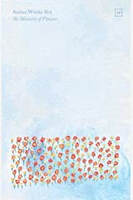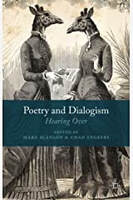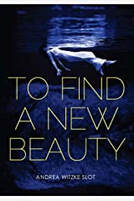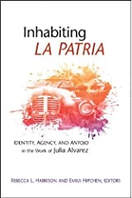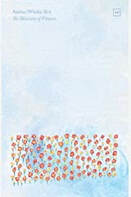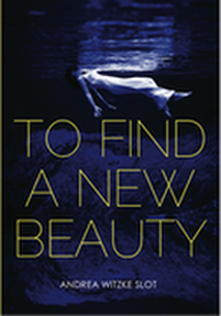
The Ministry of
Flowers Valley Press, Nov 2020 "A truly compelling and original work, The Ministry of Flowers intimately weaves cultural concerns with family drama and questions of personal identity and societal gender expectations into a dream-like tapestry that’s as sharp-edged as it is gorgeously rendered. Slot’s visceral collection smolders with heartache, gritty natural landscapes, and an insistent lyrical beauty that both celebrates and haunts the edges of our familiar world." John Sibley Williams, author of As One Fire Consumes Another, winner of the Orison Poetry Prize |
As the world grapples with the tragic human cost of the global pandemic and its aftermath, the need for kindness and gratitude has become more important than ever. The Ministry of Flowers is in many ways a book for our times, one that offers hope in a changing world. The poems call into stark relief the brevity of human life, while also emphasizing the urgent need to connect with others and offer acts of kindness as a way of healing and moving forward.
Taking its title from an Emily Dickinson poem, the book explores how flowers, both real and metaphorical, are at the heart of a kinder world. With a strong ecological focus, the poems celebrate nature’s continual ministry in our lives and highlight the need to respect the ecosystems that sustain us. The Ministry of Flowers speaks eloquently to a post-pandemic society, one in which compassion as well as forgiveness (of both self and others) become the seeds of the gentler, fairer world we seek.
Cover design by Jamie McGarry
Cover illustration by the author
Taking its title from an Emily Dickinson poem, the book explores how flowers, both real and metaphorical, are at the heart of a kinder world. With a strong ecological focus, the poems celebrate nature’s continual ministry in our lives and highlight the need to respect the ecosystems that sustain us. The Ministry of Flowers speaks eloquently to a post-pandemic society, one in which compassion as well as forgiveness (of both self and others) become the seeds of the gentler, fairer world we seek.
Cover design by Jamie McGarry
Cover illustration by the author
Kindness is an active force in these poems, a political force to restore and protect the net of relationships among us but also between ourselves and the world... many of the poems [in The Ministry of Flowers] send their words out to encounter those the speaker may have lost in the ordinary way of things (a grandmother or a friend dying, a child growing into her own independence) or through addiction or illness. Slot is a poet of loss and recovery, flying west through time zones to her birth country, back in time to where she might retrieve what has been allowed to slip from her grasp, and from our grasp as well. - Susanna Lang, Rhino Reviews
|
"Andrea Witzke Slot's TO FIND A NEW BEAUTY is rich with cool, intelligent and carefully crafted poems that often have a subtext of terror and darkness. She uses a variety of personae—Penelope, Eurydice, Io, the nymph on Keats's Grecian urn, a woman who marries her sister's widower and others—in land- [and sea-] scapes that are powerful personae too in these poems."— Marge Piercy
"In the background of Andrea Witzke Slot's TO FIND A NEW BEAUTY glimmers the controlling metaphor of the Biblical garden; in the foreground is the body's desire, longing that reveals itself in tensions that roil between origin and some possible, almost imaginable, end point.... The speaker's restless eye keeps catching upon images from the landscape that suggest to her what alternative garden might still be created by human hands. What lay between Alpha and Omega are transience, uncertainty and shifting tides. This is a volume of poetry, then, celebrating animation, celebrating pilgrimage not so much in its common religious or secular senses, but rather in a qualified archetypal sense; that is, these poems trace the human quest to recover the sacred via the potential transformative powers inherent in human agency."— John Hoppenthaler "How have you been haunted? TO FIND A NEW BEAUTY, Andrea Witzke Slot's first book of poems enumerates the many ways that elegy, witnessing, and the dead haunt the living. With elegies that at once celebrate the dead and long for their touch, TO FIND A NEW BEAUTY is interested in just that—finding a beauty in the refuse, in what is left, in the hulking remains of grief. Quite simply, the moan of the dead haunts the reader. Through an intense intimacy, Slot's poems touch the reader 'like a ghost whose white dress whispers over the sheets of your bed.' Be prepared to be touched."—Roger Reeves "Slot's work stands equal with that of Snyder and Oliver. With bewitching language, she pulls the reader into a gentle current of rolling imagery. Suspended within the flow of these pages, I was carried to a place of calm reflection."— L. M. Browning |
"Andrea Witzke Slot’s finely crafted first book [To find a new beauty] echoes with the voices of writers past and present. H.D., David Baker, and John Keats are only a few of the poets whose work informs this refreshingly well-read debut...Slot’s treatment of her Modernist predecessors proves to be especially fascinating as the book unfolds. Frequently drawing attention to female figures whose work has escaped the widespread recognition seen by such male writers as Ezra Pound, T.S. Eliot, and James Joyce, Slot suggests that poetry may redirect the focus of our discussions of literary tradition. In many ways, poetry affords the opportunity to revise the cannon, redefining its terms to suit a changing cultural landscape. In Slot’s new book, poetry becomes both an homage to tradition and an intervention. Slot’s use of epigraphs to comment on prevailing interpretations of the cannon is equally impressive. Frequently excavating overlooked gems—a phrase, an image, a metaphor—Slot cautions us against becoming entangled in the sweeping manifestoes and ambitious claims that populate literary history. Rather, she highlights the value of the smallest, but often most dazzling, accomplishments of her predecessors...For Slot, the past does not limit us, but rather, serves as the starting point for one’s own contribution to an artistic conversation. Appropriation, reinvention, and dialogue afford exciting possibilities, which are not available to those working outside of an established literary tradition. It is her liberal approach to this received source material that renders her work so rich from an interpretational standpoint. With that in mind, the poems in this collection lend themselves to careful attention, and reward re-reading. To find a new beauty is a book that’s as well-read as it is engaging. This is a wonderful debut from a talented poet.- Kristina Marie Darling- Lit Hub
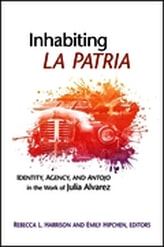
Inhabiting "La Patria": Identity, Agency, and "Antojo" in the Work of Julia Alvarez
SUNY Press, 2013 Andrea's essay “'Between the Scylla and the Charybdis': Remapping Subjectivity in the Dialogic Waters of Julia Alvarez’s 'The Other Side/El Otro Lado'” illustrates how the social fabric of dialogic interaction in Alvarez's long poem is driven by the intense subjectivity and structural/contextual power of the poetic form. By circling the power structures of speech and social class structures, Alavarez's poem not only gives voices to those who are without voice but, more importantly, awakens readers to the thought patterns that often invisibly limit ourselves and others. Drawing on theories by Chela Sandoval, Gloria Anzaldúa, and Homi Bhabha, the essay demonstrates Alvarez uses the “in-between” of cultures, classes, and languages to create insurgent emancipatory weaponry in her complex, multi-voiced work. Read through PROJECT MUSE or buy the book here: |
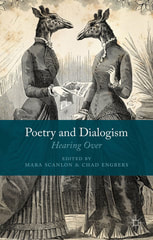
Dialogism and Poetry: Hearing Over
Palgrave Macmillan, 2014 Andrea's essay "Dialogic Poetry as Emancipatory Technology: Ventriloquy and Voiceovers in the Rhythmic Junctures of Harryette Mullen’s Muse & Drudge" focuses on the complex movement of subjectivity in Mullen's work through the act of ventriloquy. By demonstrating how this play on voice--as it occupies numerous ideological positions--the essay who's how the poetic form can break down and break through the subtle forms of subjugation that continue to infiltrate social relationships and thought. Read the essay HERE OR buy the book here: |
